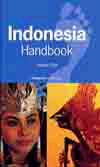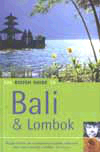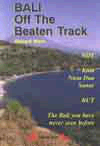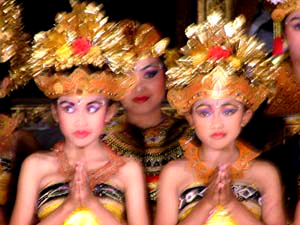Travel Guides with references to Cabé Bali:
English

Indonesia
Handbook

The Rough Guide
to Bali

Bali off the
beaten Track

Indonesia
Handbook

The Rough Guide
to Bali

Bali off the
beaten Track

Its not only pure coincidence that Bali is often called the "Island of Happiness", the
"Island of Smiles" or the "Island of Light". On this island, each day seems to
be dedicated to a different deity. Not only Shiva, Brahma and Vishnu are worshipped, but also the
Christian Saints, Buddha as well as the rice and the water ghosts. Every evening offerings to the gods
are made in the shrine of each community household.
All beings are in the care of the gods, also guests. They are no strangers, but part of this Island.
Therefore it is also common, that the native people of Bali consider guests as friends. There is always
time for a little chat, for a joke, for exchange of news.
In Bali, sensual pleasure, dance, music and flowers - yes, even the greeting ceremonies - are part of an
obliging friendliness, which has its roots deep in the Balinese tradition.
To the visitors, the Island presents itself in a quite exotic manner. Bizarre coastal lines, miles of beaches, some are white, some are Volcanic black, interrupted by peaceful palm groves. Breathtaking views of holy mountains varied by tranquil rice fields and terraces. But not only tropical abundance is awaiting the visitors, also drought regions with dry bushes are waiting for exploration. Nevertheless, everybody will always be fascinated by the rice fields, where the palette of colors extends from deep rich green to flashing golden yellow. Further in Eastern Bali you will find also banana and coconut plantations. Here the tourism has not yet left its negative influence, the life in the pastoral community has still priority to busy tourism. Those who are looking for rest and relaxation, they will find it here.
Ngurah Rai International Airport, the Airport of Denpasar, the Capital of Bali, can be reached from almost all Capital Cities in the world. You may choose the Airline of your choice, e.g. Thai International Airways, Singapore Airlines, Qantas, Malaysian Airlines, British Airways etc.. The flight from Europe lasts about 16 hours.
Citizens of the European Community require a passport which must have at least a remaining validity
of six months. A 30 days Visa can be applied at the Airport upon arrival, it is non prolongable and costs
approximately US$ 25,-
For citizens of other countries, we recommend to contact either the Indonesian Embassy or an Indonesian
Consulate of the respective countries for information about the Visa application.
Vaccinations are not mandatory, but we would like to recommend prophylactic vaccination for Hepatitis A/B and Typhus. Please contact the nearest Tropical Institute near your domicile for advice.
The local currency is the Indonesian Rupiah. Moneychangers accept Traveller Cheques and Banknotes, but
unfortunately the exchange rate differs from Bank to Bank, also among the Authorisized Moneychangers. Smaller
US$-notes up to US$ 50.- has lower exchange rates than US$ 100,- Banknotes.
Most of the Hotels and shops accept Credit Cards and Traveller Cheques, but as cabé Bali is a small
private site, at the moment we are not in the position to accept Credit Cards and Traveller Cheques. We prefer cash payment in Rupiah (IDR).
The national language is the Bahasa Indonesia. Many local languages and dialects apply in each respective
region, e.g. Balinese, Javanese, Sundanese etc. Balinese people communicate in their community and family in the
Balinese language.
In most of the tourist centres the local people will understand and speak broken English.
In Bali, res. in whole Indonesia, tropical climate applies with an average ambient temperature of approx. 27 Centigrades with a high humidity in the air, especially in the coastal regions. In the mountains, at a higher altitude, the air is rather cooler.
Personal needs, such as books, films, cosmetics, cameras, handycams etc. can be taken with you. Custom
clearance is required for 200 pcs cigarettes or 50 cigars or 100 gr. tobacco, 1 lt. spirits and gifts up
to US$ 100.-. It is strictly prohibited to bring with you firearms, pornographic material and narcotics
res. drugs.
Leaving the country, you are not allowed to take with you precious historical objects without export permit,
in general they are objects of art older than 50 years age.